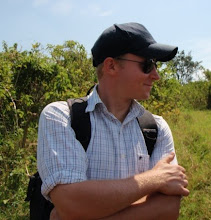 (Pictured Here: Verene [wearing the red blouse] and Callixte [wearing the grey suit and the red tie] at the Nzigiye Sector Office on their wedding day.)
(Pictured Here: Verene [wearing the red blouse] and Callixte [wearing the grey suit and the red tie] at the Nzigiye Sector Office on their wedding day.)Yesterday I attended the civil wedding of Callixte and Verene. The ceremony took place at the sector office in Nzigiye, a neighboring sector of Rubona (the sector where I live and work).
Civil weddings are pretty tame; at least, the ones I have attended are pretty low key. They generally take place at a sector office where the head of the sector conducts the marriage ceremony, which usually includes from two to eight couples. Each couple takes turns making the marriage official through the state of Rwanda - the public officials presiding over the group ceremony take the couples' finger prints and have the couples sign some legal documents and swear some oaths.
Civil ceremonies are generally attended by local family members and friends. This doesn't sound like it would be a lot of people, but because up to eight couples can get married at once, the room at the sector office can fill up quickly. These ceremonies, though modern in nature, are traditional in the sense that the civil wedding itself takes place in the sector where the wife's family lives. There is also a reception held afterwards; depending on the family's economic means the reception could be at a hotel or at the home of the wife's family. If the reception is held at the later location, you will probably find more traditional food and drink - these are the best receptions, I feel.
The dowry and the church ceremony usually come after the civil wedding, though not necessarily right away. I have been a part of some ceremonies where the civil marriage happened on a Saturday and the next day was the dowry and church wedding. However, I also know some couples that have had their civil wedding months ago and are still saving up money, and vacation days from work, in order to properly celebrate at a church. The order of these events really all depends on each couple's economic situation and work schedules.
I may have explained a lot of stuff about civil weddings in an earlier blog entry, but I am too lazy to sort through them to check. At any rate, I wouldn't normally even write about a ceremony that, though very important, is so bland. However, this particular civil wedding had a very interesting back story. Well, interesting to me, at least, because Callixte and Verene are both students in the adult English language course I teach on weekday evenings.
Verene is a bio-technician in the lab at the health center I work at and has been a great friend of mine since the day I arrived in Rubona; she has been registered in my class since it began. Callixte is a neighbor who has also been a student of mine for almost two years now. I am pretty sure they knew each other before the class began, but I was told that they really didn't get to know each other more personally until they started studying together. Apparently, they have been 'cultivating the love' (dating) for a while now and have decided to take the next step and get married.
I am not taking credit as a matchmaker or anything. I just think its cool that my English class played the role that it did in their love story.
Verene and Callixte, I wish you many years of wedded bliss. May God bless you both.
